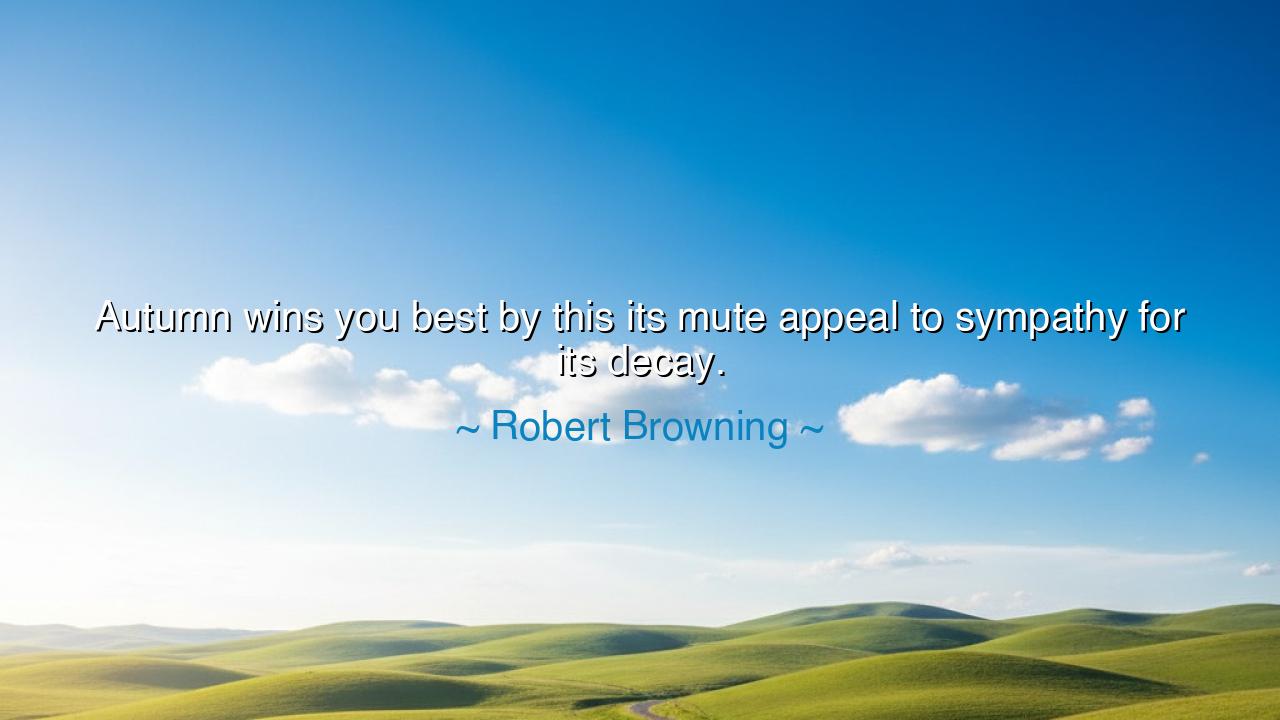
Autumn wins you best by this its mute appeal to sympathy for its






In the words of Robert Browning, *“Autumn wins you best by this its *mute appeal to sympathy for its decay.” The poet speaks of a season not in its triumph but in its waning, not in its harvest’s abundance but in the silent decline that follows. Autumn, with its falling leaves and fading warmth, does not boast of power or permanence, but rather moves the heart by its quiet confession of mortality. It is a reminder that beauty can dwell not only in beginnings but in endings, that the soft whisper of decline may stir deeper emotions than the trumpet of conquest.
The ancients, who watched the turning of the year with reverence, knew this truth. To them, Autumn was the time of sacrifice, when Persephone descended into the shadowed realms and the fields gave their final gifts before winter’s silence. The decay of the season was not despair but dignity, a noble bowing of the head before the eternal cycle. Browning, in his line, inherits this ancient wisdom: that the sympathy evoked by fading things binds us more tightly to them. For in their passing, we glimpse our own fragility, and in that recognition, we are made more human, more compassionate.
History too has shown how endings can inspire more than victories. Consider the tale of the Roman general Cincinnatus. Twice he was called from his plow to save the republic, and twice he laid down supreme power when others would have grasped it with hungry hands. It was not his triumph in war that made him beloved for centuries, but his return to simplicity, his acceptance of life’s cycle — rise, fall, and return to earth. Like Autumn, his greatness lay not in endless expansion but in the nobility of letting go, and so his legacy has endured longer than the fleeting glory of many conquerors.
Browning’s words carry a lesson for the soul: that sympathy is born when we behold what is fragile, vulnerable, and passing. The springtime dazzles, the summer exults, but it is Autumn, with its sighs and its soft hues, that draws us nearest. For in its decay we see not defeat but truth — the truth that all things must wither, and in their withering, they call forth our tenderness. The crimson leaf clinging to its branch moves us more deeply than the green abundance of midsummer, because it reminds us that beauty cannot last, and so must be cherished in its fleeting hour.
In our own lives, too often we grasp at eternal summer, chasing after perpetual growth and glory, forgetting that the noblest part of existence is to bow with grace when the time of fading comes. The warrior who accepts age, the leader who steps aside for the next, the parent who watches children go forth — these embody the spirit of Autumn. They win the sympathy and reverence of others not by clinging to power, but by yielding to the natural rhythm of life with dignity.
Therefore, let us take from Browning’s verse a practical teaching. When you behold decay — whether in the season, in the crumbling of old stones, or in the lines upon a beloved face — do not recoil. Instead, give your sympathy, for in that sympathy you grow closer to wisdom. Cultivate gratitude for what passes. Sit beneath the fading trees and learn that decline itself is a form of beauty, one that calls forth tenderness rather than sorrow. Speak gently to those in their final chapters, and honor them not for what they were in their strength, but for what they are in their quiet surrender.
And so, children of time, remember: it is not always the rising sun that moves us, but the setting sun, casting its last light upon the earth with colors more vivid than the noonday. The lesson is this: embrace the mute appeal of Autumn, for in its silence is the deepest truth of all — that to pass away with grace is as noble as to flourish with vigor. In your own journey, learn to cherish both bloom and decline, for in the rhythm of both, life finds its eternal harmony.






AAdministratorAdministrator
Welcome, honored guests. Please leave a comment, we will respond soon